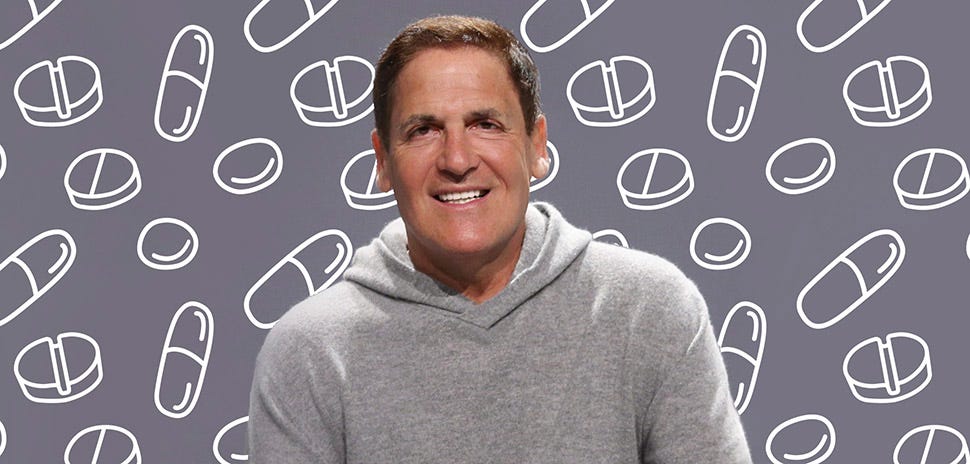Mark Cuban's Swing to Disrupt Healthcare
One expert sees an uphill road for the billionaire entrepreneur
Mark Cuban wants to be a disruptor in medication cost affordability through his direct-to-consumer online pharmacy, Cost Plus Drugs.
The company’s aim is to cut consumer costs by manufacturing drugs or buying them wholesale and selling them at a 15% upcharge.
Cuban’s goal, roughly stated:
"Hopefully, when it's all said and done, they'll say, 'Boy, that guy f---ed up health care, so now people aren't afraid of not being able to afford their medications," he says. "To me, that would be the greatest accomplishment."
While Cuban recognizes an exciting business opportunity, he’s pursuits seem to additionally involve ethics and a commitment to serving society and people in need.
Cuban was not understated about his intent with drug pricing and healthcare.
“I think his bold communication is great,” says Aaron Emmel, a doctor of pharmacy with a masters in healthcare administration and the founder at Pharmacy Tech Scholar. “It takes bold people to accomplish great things.”
Yet he doubts that Cuban is alarming or scaring competitors.
“I suspect the industry is not that concerned with his comments,” Emmel says. “I may be wrong but the market forces are so strong that one loud voice is not going to effectively counter the immense lobbying efforts of the other industry players that impact drug pricing.”
He elaborates:
“While pharmacy benefit managers (PBMs) are facing immense pressure from regulators at the moment, we can still see their unyielding influence in play with the recent decision by California Governor (Gavin) Newsome to veto a common sense PBM reform bill.
“And while drug pricing reforms are a constant item in political campaigns, we've seen very little action that has a substantial impact on drug pricing, or one that would bring the U.S. in line with other developed nations,” Emmel states.
There is another reason that he doesn’t see Cuban likely to make the impact he chases.
“From the pharmaceutical company perspective, much of the key players and associated lobbying efforts are in the context of newer, branded medications,” Emmel points out. “At present, Cuban's efforts don't appear to be a major threat to high margin, emerging therapeutics.”
Cuban’s stated objectives and confidence do fit an emotional, psychological need yet reality needs to be given more weight.
“I think his comments may bring hope to those affected but again, many will be aware of the deeply ingrained healthcare infrastructure,” Emmel says. “Those of us in the pharmacy world are hopeful for PBM reform, which will help, but then there is the issue of drug pricing from the pharmaceuticals manufacturers.”
He does voice a concern as other leaders in the industry have as well.
“There is a valid argument that R&D (research and development) efforts will decline substantially if pricing is pressured downward,” Emmel says. “The way it sits, the U.S. essentially subsidizes drug development for the entire world with the desperate pricing models across the globe.
“It may well take a comprehensive reform, of not only the U.S. Healthcare system, but the global healthcare infrastructure to ensure that we continue to achieve substantial advances in health technology without further bankrupting the future of our children.”
Cuban’s business may be missing some marks. There could be some misalignments.
“Well, the obvious issue is his focus on generic — off-patent — medications,” Emmel points out. “While pricing issues certainly exist there, the bigger issue is the extremely high cost of newer innovative medications. I am not aware of anything that he is doing with Cost Plus Drugs that is going to drive change in this area.”
He remains skeptical, despite Cuban’s noble intentions, that the entrepreneur can win many battles, even with the work towards lower cost medications.
“I also don't think he will be able to drive generic drug prices low enough to cause an effective shift in the use of lower cost generic medications from higher cost, new brand medications,” Emmel forecasts.
If, however, Cuban succeeds to any notable degree, the media and societal narrative could dramatically improve about him and simultaneously, become worse about the longstanding problems society has endured.
“If we ever get to a place where there is a drastic change in drug prices across the board, I suspect we will look back unfavorably on how we got to where we are now,” Emmel says.
“Hindsight is always 20/20,” he admits, adding that, “It is the entire evolution of the 100-plus-year existence of the U.S. medical system that has led us to where we are today.
“And we've known for decades that our health system is highly inefficient and unsustainable.”
Follow on the LinkedIn company page for Communication Intelligence
To sponsor this publication, place an ad or have links published, check this page.







